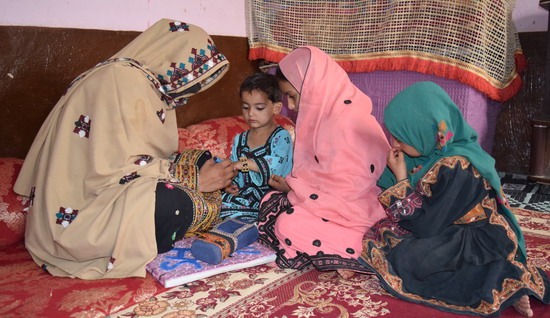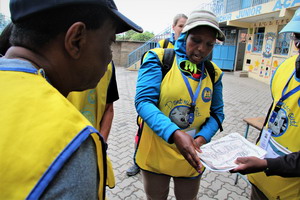 19-year-old vaccinator Shamima with her intricately embroidered notebook cover and carrier bags
19-year-old vaccinator Shamima with her intricately embroidered notebook cover and carrier bags
8 March 2019 – Across the Eastern Mediterranean Region, efforts to stamp out vaccine-derived polio outbreaks and interrupt transmission of wild poliovirus depend on the hard work of hundreds of thousands of men and women. On International Women’s Day, we invited some of the women working on the frontlines of polio eradication in the Horn of Africa, Pakistan and Afghanistan to share what they bring to the battle against polio.
 Julia Kimutai and her team consult the micro-plan before beginning immunization activities “I am a good listener, a good communicator and I am patient. These tools help me in my daily work,” says Julia Kimutai, a 38-year-old community strategy coordinator who works at the sub-county level in Kenya.
Julia Kimutai and her team consult the micro-plan before beginning immunization activities “I am a good listener, a good communicator and I am patient. These tools help me in my daily work,” says Julia Kimutai, a 38-year-old community strategy coordinator who works at the sub-county level in Kenya.
Julia specializes in dense urban areas with plenty of high-rise buildings, which typically means climbing a lot of stairs and knocking on a lot of doors. But for her, the rewards are worth it: “I love this job because it satisfies my heart. It makes me feel like I have assisted somebody.”
In Balochistan, a province characterized by vast land, hard-to-reach communities and a deep sense of tradition, 19-year-old Shamima takes pride in standing out. An expert embroiderer, she created an eye-catching cover for her vaccine carrier, and adds sketches and other details to the maps she uses to plan her route. “Women are very creative,” she explains. “The embroidered cover makes my vaccine carrier more attractive, and this creativity created more acceptance for me in the community.”
“Sometimes when children don’t want get vaccinated, I show them the map sketches, which makes them get ready for vaccination quickly,” she says.
Her advice to other women? “I suggest that they should utilize their creativity to earn the trust of the community.”
In a nearby district of Balochistan, 70-year-old Bibi has spent 30 years as a traditional birth attendant and two years as a Lady Health Worker. She believes that for all the challenges women confront, they still have opportunities and benefits that are not available to the men who work in the polio programme.
“Building rapport is one of the skills I draw on to end polio in my community. This skill helps me to build trust and also assists me in creating a friendly environment for parents and children,” she says.
What Bibi calls a “woman’s touch” can be a vital lifeline in connecting with the community.
“I like to spend extra time with parents and I take extra care with each child I see. Before vaccinating them, I clean their nose with clean handkerchief. It also helps when children know that while being vaccinated they will receive a toffee or some other small gift,” she explains. The warmth and trust that Bibi has with her community means that more parents ensure their children are home when Bibi visits during campaigns.
Asha Abdi Dini, a district polio officer in the Hamar Wayne area of Banadir, Somalia, agrees. “Women are more equipped to go and talk to mothers, and go door to door if need be.”
Asha Husein Maolim, a 48-year-old district polio officer in the Heliwa area of Banadir, explains why.
“Women have access to houses, as culturally people accept you more easily,” she says.
“Women are calm. They greet and understand other caregivers easily, and can explain concepts like benefits of vaccination easily. Since 1998, people in our area, whom we visit, know about our programme and our health goals so we have built trust already. They see our vaccines and our aprons, so they trust us.”
For Asha, working in the polio programme as a Somali woman is a way of showing the world that Somali women are more empowered than people might think. “Women are the backbone of the polio programme. Women are vaccinators, social mobilizers, and also caregivers in Somalia. We make the programme – and the world – run. Most of the vaccinators in Heliwa are women.”
In Afghanistan, women are similarly valued in this line of work.
“I’ve been doing this job for over 13 years now. I’m married with two kids. I used to work in Kuduz in the local clinics, and gradually got promoted to where I am today,” says Dr Friba, a 40-year-old provincial polio officer named based in Kabul.
“I’m on the panel to select other polio workers, and I try to get qualified females to join, because it’s really important to have women in this programme. The most difficult part of my job is to select qualified females. Parents like to talk to women. It makes it so much easier for people to talk to us and get convinced to vaccinate their children,” she says.





